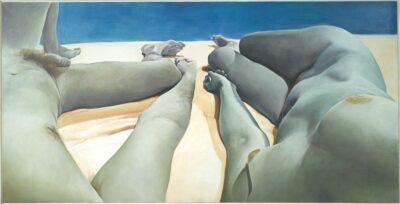Chance The Rapper Is A New Creation
The old has gone, the new has come.
That’s a line from 2nd Corinthians, I’m sure Chancelor Bennett knows it. He probably grew up hearing it thundered from a pulpit like I did. Whether you ascribe to the template of “born again Christian” or not, there is power in these words. There is power in delineating different phases in your life, in commanding new growth in yourself, in speaking a new beginning into life. Words have power, they build our worlds. Walter Fisher, the leading theorist behind Narrative Theory once asserted that “humans as rhetorical beings are as much valuing as they are reasoning animals,” and music is much more about what we find valuable than what we find reasonable. In fact, music is a very unreasonable thing. It’s the opposite, (though still mathematical) product of following logic to a necessary endpoint. Music is the unspeakable, the deepest emotion welling up from a person as a valuing animal, and Chance The Rapper is redefining what is and what should be valuable about music. He has located the value of his music outside the locus of the music industry, and often indicates that his personal values fall outside of the mainstream and firmly in the realm of Christianity. If there’s a single artistic force in the music industry today who feels like a new creation, it’s Chance The Rapper.
Last night Chance released his third full-length statement of intent since his technicolor breakout tape Acid Rap in spring of 2013. Acid Rap was free, and though it was almost unanimously declared one of the best albums of the year, no label deal came on the heels of its success. Chance The Rapper remained independent, and still is. It is hard to call works this fully-formed “mixtapes” though. His latest release, Coloring Book, is an expansive, elated follow-up to last year’s Surf, a community-focused creative act delivered to us under the moniker Donnie Trumpet and the Social Experiment that continues to live and breathe its own sweet and salty air a whole year later. Somewhat infamously, Surf could not be nominated for any Grammy Awards because Chance opted to release the tape for free. He created his own paradox by sidestepping the capitalist underpinnings that tie art into our current system for honoring it. I consider it his own cheerful twist on a Kanye-level award show interruption, one that silences no one, but instead speaks volumes about what music is worth and which things are valuable.
Coloring Book makes a similar move, because it asserts once and for all that Chance has surpassed his idols and his peers as a musical force. So much so that he doesn’t need a label or anyone else to assert that for him. Even trying to give him a title like the greatest rapper alive feels like both a misstatement and an irrelevant distinction–though he outperforms Kanye West, 2 Chainz and Lil Wayne within the first two tracks, he’s rendered the point moot. Everything he says is unexpected, nothing is rote, I can’t wait to hear what he’s going to say next, while those three forces repeat the mantras we’ve already expect from them (Not that “School of hard knocks / I took night classes” isn’t a valuable new 2 Chainz quip.) Chance easily out-sings Justin Bieber, the biggest pop star of our current era, and one of the tapes only low points is when he enlists ever-trendy young rappers Lil Yachty and Young Thug for “Mixtape.” This song drags and stinks like a swamp, mostly because it sounds like Chance trying to sound like someone else, and it’s brought into sharp focus by the next song, the glistening babble of “Angels.” Still, all these inclusions continue to indicate Chance’s values; Coloring Book isn’t about competition, it’s about creativity. The collective feel of Surf lives on here, if slightly morphed. There is also power in a name, even people still in the dark about Donnie Trumpet know Chance The Rapper. Releasing the tape under his name by no means feels like a concession, and Chance isn’t just coloring outside the lines–he’s redrawing them. He’s inviting all of us to redraw them. He doesn’t want to play by the rules of the old music industry. He is a new creation, and by living that, he’s opening up the space for something totally new to emerge.
Labels and other industry machinations have been holding artists back and holding them captive for years now. We know this, but we are beginning to learn about it in new ways, ways that drive the impact of this capitalistic exploitation home. Streaming services helmed by artists themselves are erupting, free releases and mixtapes and collaborations and the value of a song are all in flux. One reason Prince’s legacy looms so large is because of the way he tirelessly insisted on having control over his own music. Eventually, he assumed “ownership of his music publishing — the copyrights for songwriting — and his recordings,” and though I’m not clear on whether Chance owns his own music, it seems clear that a label definitely doesn’t. “No Problem” playfully pokes at the tension Chance may have experienced in this realm (“If another label tries to stop me / gon’ be some dreadhead n—-s in ya lobby”), but this is more likely to be geared at potential collaborations than anything else. Most artists don’t own their art, or even their own ability to freely contribute to a creative act such as this, most are beholden to others who have more money and power than them. Surely this drives the subject matter of art, too. It’s hard to think of a tape with this much blatantly Christian imagery that has this much mainstream impact. Would a label have allowed it?
http://www.youtube.com/watch?v=uZyt5dSNcFo
Last night when the tape hit Apple Music, my Twitter feed was full of friends with secular backgrounds making jokes about their new allegiance to Christianity via Chance’s gospel. On “Blessings” Chance pairs a vow to praise God until his last days with the Internet ephemera adlib “don’t be mad.” It’s the quintessential juxtaposition of Bennett’s aesthetic, and is mimicked in the commentary about faith from eager listeners. But they’re not really talking about Christianity in practice, they’re talking about one of the byproducts of faith that Chance possesses in droves. They’re talking about an allegiance to, and a desire for joy.
To me, someone who was raised in the church, wounded there, abandoned and betrayed there, joy has begun to encapsulate the only spiritual pursuit I can identify with in good faith. I don’t keep a Bible in my house anymore, I don’t know if I believe in Jesus. But I believe in joy. Joy is not beholden to a Christian framework, and even though Chance includes specifics to his own belief, these songs are deep and wide enough to contain multitudes. They can contain your joy, and mine, and to Chance’s credit, they do. Inherent in everything Chance raps or sings or squawks, there’s an underlying sense of deep, pure joy welling up from somewhere most of us don’t have access to, or rather, from a place that we haven’t tried to access in years. Joy, in its many splendors, isn’t something our society values. It’s not cool. If there’s a single thesis that defines the core of Chance the Rapper’s values, it might be to make joy cool, appealing, something worth pursuing.
Because joy isn’t a possession, it’s a state of being. It’s not for sale. It’s something you have to wake up every day and actively choose. It’s a positioning of the self. You don’t attain joy, you practice it, you prepare your heart for it. Joy isn’t something that comes to those who have had an easy life, who are rich or soft or simple. In my experience, it’s the opposite. Joy lives in those who, in the face of every horrific event they encounter, continue to choose it. Chance’s background growing up on the Southside of Chicago speaks to this, too. Joy is the core value not only on Coloring Book, but on Surf, Acid Rap, on the improvised, goofy-as-fuck joint tape with Lil B that Chance did last year, on his lightsaber of a verse on “Ultralight Beam.” Joy and capitalism have long been at odds, but as Chance and Kanye join together again, to kick off Chance’s record this time, they remind us of their values: “Music is all we got.” This is something too precious to give other people ownership over. “I don’t make songs for free, I make them for freedom,” he sings, and it hits like scripture.
As things currently stand, joy won’t make you popular on the Internet, it holds little currency here. It gives you little power in the sense that power is celebrated in this industry. I think living online in this culture that values mocking others, getting the most followers, RTs, likes, pageviews–this is sucking the joy out of us. I think it is erasing our value as subjective individuals, our particular power as valuing animals. But there are many forms of power, and though not all of them result in money or popularity, some of them yield things that are infinitely more valuable. There’s a tendency in our culture to expect bad things and marvel at the good, to prepare ourselves for disaster, disease and hatred, and be shocked when delight, abundance and love show up. At the end of Coloring Book, on “Blessings (Reprise),” Chance preaches that we should prepare our hearts for joy in the same way we prepare for pain. Are you ready for your blessings? Are you ready for your miracle? Joy is a choice you can always make, even if it’s all we got.
You can listen to Coloring Book via DatPiff if you’re not an Apple Music subscriber.
You might also like 




















